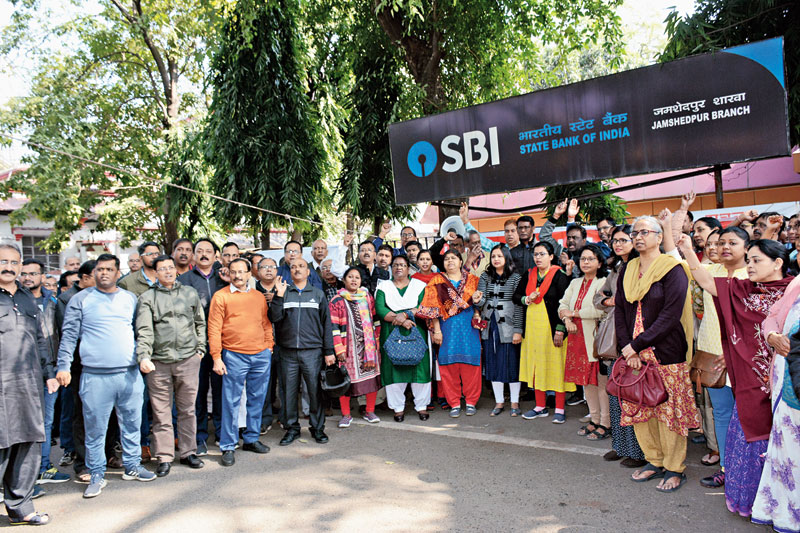Nationalised banks were shut on Friday, the first day of the two-day strike by the United Forum of Bank Unions, and the timing — the turn of the month — affected businessmen and salaried people alike.
The strike has been called to press for a host of demands,including wage hike, pension provision revisions, and five-day banking, and against bank mergers and privatisation.
Protesting bank employees held agitations across cities, raising slogans.
“Merger and amalgamations in the banking sector is a prelude to privatisation. We oppose this,” said a bank employee staging a demonstration outside the Main Road branch of Bank of India in the state capital.
State president of National Confederation of Bank Employees Jayant Kumar Jha said the bone of contention was wage revision.
“The government for the past two years has not gone for wage revision. This is a major issue. If our demands are not met this time, we shall go for a three-day strike from March 11 to 13 and from April 1 an indefinite strike will start,” Jha said.
As banks remained out of bounds, common people suffered the most on a month-end.
“I was not aware of the bandh and had gone during lunch hour to deposit cash in my daughter’s account,” said Nandlal Mahto, 58, a Tata Steel employee and a resident of Kadma in Jamshedpur.
“She is in Patna and badly needed money. The security guard at the bank informed me about the bandh. Since Sunday is a holiday, the bank would now open on Monday. I had no option but to call up my daughter and say I was helpless. I will now try to send the money online with the help of somebody because I am unfamiliar with online transactions,” the father added.

A demonstration outside Bank of India branch in Bistupur, Jamshedpur Picture by Bhola Prasad
Traders bore the maximum brunt of the strike.
“Business remained dull on Friday. Very few customers turned up at my shop because of the bank closure,” said Arun Kumar Sahu, who runs a sanitary hardware at Argora in Ranchi.
Dinesh Agrawal, a foodgrains wholesaler at Pandra market in Ranchi,echoed the sentiment.
“No bank, no business. Business fell by 50 percent as retailers did not turn up. While an average footfall of retailers is 50 at my shop, on Friday it was 25,” he said.
Agrawal, however, said netbanking and ATM facilities helped.
Services such as cheque clearance, electronic cash transfer, draft issuance, money deposit, letter of credit and bank guarantee were badly hit making it difficult for businessmen who rely on the sector heavily.
“It was not the question of cheques not being cleared within 48 hours, but who will pay two days’ interest on loans accrued because of delay in cheque clearance?” said Suresh Sonthalia, a Bistupur trader and general secretary of the Confederation of All India Traders’ Jharkhand chapter.
“The government should make provisions for traders so that no one suffers because of the whimsical attitude of banking unions that resort to agitation every few days,” Sonthalia fumed.
Rintu Rajak, Jamshedpur convener of the United Forum of Bank Unions, said the strike was necessary, and that the first day of the strike was “a huge success”.
“Around 4,000 officers and employees in over 300 branches of public and private banks took part in the strike. The strike was called after Thursday’s call by Indian Banks’ Association was unsuccessful in resolving the impasse,” said Rajak.
In coal town Dhanbad as well, more than 200 branches of public sector banks remained closed.
State president of Bank of India Officer Association Rajkumar Srivastava said: “We carried out the strike in Dhanbad as part of the nationwide protest and all banking transactions such as cash deposit, withdrawal, cheque clearance, loan disbursement remained shut.”










